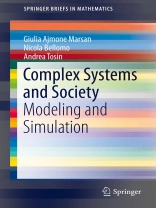This work aims to foster the interdisciplinary dialogue between mathematicians and socio-economic scientists. Interaction among scholars and practitioners traditionally coming from different research areas is necessary more than ever in order to better understand many real-world problems we face today. On the one hand, mathematicians need economists and social scientists to better address the methodologies they design in a more realistic way; on the other hand, economists and social scientists need to be aware of sound mathematical modelling tools in order to understand and, ultimately, solve the complex problems they encounter in their research. With this goal in mind, this work is designed to take into account a multidisciplinary approach that will encourage the transfer of knowledge, ideas, and methodology from one discipline to the other. In particular, the work has three main themes: Demystifying and unravelling complex systems; Introducing models of individual behaviours in the social and economic sciences; Modelling socio-economic sciences as complex living systems. Specific tools examined in the work include a recently developed modelling approach using stochastic game theory within the framework of statistical mechanics and progressing up to modeling Darwinian evolution. Special attention is also devoted to social network theory as a fundamental instrument for the understanding of socio-economic systems.
İçerik tablosu
1. The Role of Individual Behaviors in Socio-Economic Sciences.- 2. Mathematical Tools for Modeling Social Complex Systems.- 3. Modeling Cooperation and Competition in Socio-Economic Systems.- 4. Welfare Policy: Applications and Simulations.- 5. Forward Look at Research Perspectives.- References.












